(Photo courtesy of Ovum)
Banks across the world are set to significantly increase spending on new payment technology in 2016, according to a new report from Ovum, the independent technology firm.
Driven by increased emphasis on security, changing consumer behaviour, and new technologies – such as Blockchain, mobile payments, and real-time payment transactions, almost two in three (61 percent) banks globally will increase their spending on payment technology next year.
This is up significantly on 2015, when just over half (52 percent) increased their IT expenditure on payment technology. Most tellingly the proportion of banks reporting significant increases in payments’ spending (over 6 percent) has leaped from near 10 percent to almost 30 percent. Ovum says that such a major shift is representative of the transformative levels of change happening in the payments market.
Gilles Ubaghs, Senior Analyst within Ovum’s Financial Services Technology team, comments: “Investment levels in payments have been high in recent years, driven by the need to deploy new payment services, cope with the overall rise in electronic transaction volumes, and replace ageing legacy infrastructure. 2016 will see an increase in this trend.”
Source: Ovum
The report, *2016 Trends to Watch: Payments, surveyed CIOs and other senior IT decision-makers in over 60 countries and processed data from around 6,500 interviews in 17 industries. (For the full report, see the details below.)
Security is top of the agenda for banks
Banks’ increasing investment in payment tech is aided by growing concerns over security and the need for regulatory compliance, with over 70 percent of retail banks reporting a rise in expenditure on security and anti-fraud technologies. The focus on security is not surprising given the need for top notch security across the explosion of new payment tools and services now emerging. Immediate payments are a close contender for top priority, with nearly 65 percent of banks viewing immediate payments as an opportunity across every business category.
Gilles Ubaghs, explains: “Security is always a core issue for both vendors and enterprises alike and the market is set to see renewed levels of investment activity in 2016. This will be driven by the need to find new means of authentication while reducing risk and the burgeoning growth in tokenization technologies. Investment in the US in particular is likely to be high as the country continues its shift towards EMV.”
Highlighting retail banks’ concern with adding security with new ways of paying, 34 percent cite biometric technology as a priority for the coming year as well as a focus on using additional information such as location data during transactions.
Apple Pay fails to spark consumer interest
The unexpected lack of success experienced by platforms such as Apple Pay has taught banks a valuable lesson; even with the best laid intentions, it remains extremely difficult to force consumers to use new products and services without incorporating a clear ‘why’ case. The customer interface is not the same as the customer experience, and banks need to create a more compelling story for consumers with their platforms.
Gilles Ubaghs, Senior Analyst within Ovum’s Financial Services Technology team, comments, “Even the magic wand of Apple has not been enough to jumpstart the mobile proximity payment market –. With similar platforms from Google and Samsung now emerging, it would appear these platforms face several years of steady slog towards mass acceptance.”
Blockchain technology to revolutionise the payments landscape
As attention moves away from Bitcoin as a currency and towards the longer term use of distributed ledger technology, Ovum’s report emphasizes how enterprises from banks to merchants need to get to grips with this technology now. Blockchain and distributed ledger technologies are finally approaching practical applications as the regulatory environment begins to become clear.
Gilles Ubaghs observes, ‘Not every organization will need the Blockchain in the short term, but what they will need is an understanding of where it can fit into their organization. The scale of implications of the Blockchain suggests slow movers are likely to miss out in the long term’
Ovum is a leading global technology research and advisory firm. Through its 180 analysts worldwide it offers expert analysis and strategic insight across the IT, telecoms, and media industries. Founded in 1985, Ovum has one of the most experienced analyst teams in the industry and is a respected source of guidance for technology business leaders, CIOs, vendors, service providers, and regulators looking for comprehensive, accurate, and insightful market data, research, and consulting. With 23 offices across six continents, Ovum offers a truly global perspective on technology and media markets and provides thousands of clients with insight including workflow tools, forecasts, surveys, market assessments, technology audits, and opinion. In 2012, Ovum was jointly named Global Analyst Firm of the Year by the IIAR.
Ovum is a division of Informa plc, one of the leading business and academic publishing and event organizers globally, headquartered in London. Informa is quoted on the London Stock Exchange.




